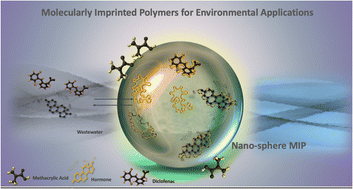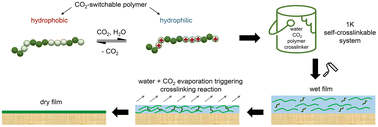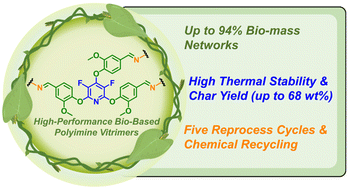Themed collection Sustainable Development Goal 12: Responsible Production and Consumption

Inverse vulcanisation: a new Starter's guide to an emerging field
This article provides an essential reading resource to the field of inverse vulcanisation, condensing all the necessary knowledge and techniques for new starting researchers to become invested in the field, whilst avoiding technical pitfalls.

RSC Appl. Polym., 2025,3, 10-42
https://doi.org/10.1039/D4LP00255E
Recent progress in the development of porous polymeric materials for oil ad/absorption application
Porous polymer materials, including polymer foams and melt-blown fibers, have nano or micro-size pores and a large specific surface area that endows them with great potential as engineered oil ad/absorption materials.

RSC Appl. Polym., 2025,3, 43-77
https://doi.org/10.1039/D4LP00211C
A new way to improve the fire safety of polyurethane composites with the assistance of metal–organic frameworks
Polyurethane (PU) is extensively utilized for its outstanding properties.

RSC Appl. Polym., 2024,2, 996-1012
https://doi.org/10.1039/D4LP00257A
Light-driven interfaces for PFAS detection and destruction
Due to exposure risks and health concerns, global limitations on per- and polyfluoroalkyl substances (PFAS) have become increasingly restrictive. Light-driven technologies can potentially destroy and detect PFAS, addressing these limitations.

RSC Appl. Interfaces, 2024,1, 833-845
https://doi.org/10.1039/D4LF00171K
Valorization of plastic waste via chemical activation and carbonization into activated carbon for functional material applications
This review analyzes plastic carbonization with respect to existing utilization methods and details its use for production of activated carbon.

RSC Appl. Polym., 2024,2, 557-582
https://doi.org/10.1039/D4LP00016A
Application of molecularly imprinted polymers (MIPs) as environmental separation tools
This review is structured to outline the applications of MIPs as environmental separation tools and assess the role of functional groups as a parameter influencing MIP performance.

RSC Appl. Polym., 2024,2, 127-148
https://doi.org/10.1039/D3LP00203A
Functionalizing graphene oxide in polysulfone composite adsorption cartridges through in-flow, in situ treatment
We present a scalable chemical method to upcycle polysulfone–graphene oxide (PSU–GO) industrial waste into customized adsorbent materials through in situ, in flow L-lysine functionalization of GO embedded in the polymer composite.

RSC Appl. Interfaces, 2025,2, 917-921
https://doi.org/10.1039/D5LF00105F
Reaction-passivation-driven delamination of spent LiFePO4 cathodes and their upgrading to highly efficient catalysts for hydrogen evolution
2-Hydroxyphosphonic acid was reported to delaminate spent LiFePO4 cathodes from Al foil via a reaction-passivation mechanism, resulting in high-purity products and facilitating subsequent upgrading to highly efficient hydrogen evolution catalysts.

RSC Appl. Interfaces, 2025,2, 634-637
https://doi.org/10.1039/D4LF00423J
Effects of the cross-linked structures of polymer gels containing iron porphyrins on photoreduction of carbon dioxide
The amount of generated carbon monoxide was influenced by the diffusion of the substrates into polystyrene-based polymer gels.

RSC Appl. Polym., 2024,2, 1026-1031
https://doi.org/10.1039/D4LP00135D
Photopatternable, degradable, and performant polyimide network substrates for e-waste mitigation
Photopolymerizable and degradable polyimides from liquid resins were developed, using existing economic chemical feedstocks, as flexible substrates to mitigate the e-waste crisis.

RSC Appl. Polym., 2024,2, 805-815
https://doi.org/10.1039/D4LP00182F
Interface-modulated morphological transition of biodegradable poly(ε-caprolactone) crystals
Semicrystalline poly(ε-caprolactone)(PCL)-based blends exhibit immense potential for the design of various environmentally friendly disposable or short-lived materials.

RSC Appl. Interfaces, 2024,1, 671-676
https://doi.org/10.1039/D4LF00073K
An algae-derived partially renewable epoxy resin formulation for glass fibre-reinforced sustainable polymer composites
A brown algae-based renewable epoxy monomer can outperform bisphenol-A based epoxy resin and composite systems by means of thermomechanical properties.

RSC Appl. Polym., 2024,2, 149-154
https://doi.org/10.1039/D3LP00174A
Fenton photocatalytic sponges for rapid separation of emulsified-oil/dyes
Based on the underwater superoleophobic property and efficient photocatalytic performance of the AM/MAA/HNTs/β-FeOOH sponge, it can achieve rapid separation of dye-containing emulsions and degradation of dyes.

RSC Appl. Polym., 2025,3, 916-925
https://doi.org/10.1039/D5LP00070J
Dual-modal detection of perfluorooctanoic acid (PFOA) using a single polymer platform: ACQ and IDA approaches
The fluorescent PPMI polymer exhibits aggregation-caused quenching (ACQ) and indicator displacement assay (IDA) “turn-on” responses towards perfluorooctanoic acid in aqueous media, with limits of detection of 0.21 μM and 16.1 nM, respectively.

RSC Appl. Polym., 2025,3, 811-819
https://doi.org/10.1039/D4LP00344F
Carbon fibres as electrodes for the recovery of nickel from industrial wastewater
Carbon fibre electrodes enable efficient electrochemical recovery of nickel ions from industrial wastewater, offering a sustainable solution for metal recycling and environmental remediation.

RSC Appl. Interfaces, 2025,2, 1031-1040
https://doi.org/10.1039/D4LF00409D
Impact of hydrolysis pretreatment on the compostability of biodegradable poly(caprolactone) and poly(lactic acid) films
Hydrolysis pretreatment accelerated PLA biodegradation by disrupting its amorphous regions, reducing molecular weight, and forming less stable crystalline structures, while its impact on PCL was minimal.

RSC Appl. Polym., 2025,3, 711-721
https://doi.org/10.1039/D5LP00041F
Depolymerization of PET by common alkanolamines yields tunable monomers to expand the design space of 3D-printable, intrinsically self-healing polyamide-ionenes
Polyethylene terephthalate (PET), a ubiquitous thermoplastic used in textiles and packaging, is one of the primary contributors to plastic pollution.

RSC Appl. Polym., 2025,3, 686-700
https://doi.org/10.1039/D4LP00372A
Debondable phenoxy-based structural adhesives with β-amino amide containing reversible crosslinkers
In this work phenoxy-like networks containing formulated β-aminoamide reversible crosslinkers featuring superior adhesive properties as well as rebonding capability are reported.

RSC Appl. Polym., 2025,3, 637-642
https://doi.org/10.1039/D4LP00369A
Design and synthesis of tetralactam macrocycle-based porous organic polymers (POPs): application in the recovery of gold from e-waste
Tetralactam macrocycles that selectively bind gold ions have been exploited to construct porous organic polymers (POPs) and the capabilities of the latter for gold adsorption are demonstrated.

RSC Appl. Polym., 2025,3, 603-612
https://doi.org/10.1039/D4LP00218K
Coarse-grained molecular dynamics simulations of mixtures of polysulfamides
We present a new coarse-grained model and molecular simulation study of polysulfamide, a new class of polymer that could be a sustainable alternative to commodity polymers like polyurea.

RSC Appl. Polym., 2025,3, 453-468
https://doi.org/10.1039/D4LP00362D
Assessing the properties of protein foams as an alternative absorbent core layer in disposable sanitary pads
Developing biodegradable menstrual products using co-stream proteins as a material alternative to fossil counterparts presents a significant environmental advantage across their entire value chain.

RSC Appl. Polym., 2025,3, 438-452
https://doi.org/10.1039/D4LP00323C
Tuning solvent strength can fractionate PVC into ultra-low molecular weight material with low dispersity
The drive towards a circular economy in plastic materials has become a worldwide goal.

RSC Appl. Polym., 2025,3, 336-346
https://doi.org/10.1039/D4LP00313F
3D printable polymer foams with tunable expansion and mechanical properties enabled by catalyst-free dynamic covalent chemistry
By leveraging dynamic phosphodiester bonds in 3D printed foams, enhanced expansion and strengths are achieved. Dynamic bonds enable higher crosslinking density and improved energy dissipation, resulting in versatile and high-performance materials.

RSC Appl. Polym., 2025,3, 428-437
https://doi.org/10.1039/D4LP00374H
Scaling up lignin-based polyols for PU coatings
Lignin-derived polyols have been synthesized and scaled-up to industrially relevant settings (5L reactors). They have been used as partial replacement of polyols in polyurethane dispersions for wood coatings.

RSC Appl. Polym., 2025,3, 420-427
https://doi.org/10.1039/D4LP00328D
Modifying bacterial cellulose dispersions with deep eutectic solvent and pectin to tune the properties of open-celled foams
Understanding the interactions between bacterial cellulose and pectin gels enables the tuning of the properties of cellulose/pectin foams, highlighting the potential for sustainable, biodegradable materials to compete with petroleum-based materials.

RSC Appl. Polym., 2025,3, 407-419
https://doi.org/10.1039/D4LP00348A
Formation of all-biopolymer-based composites with cellulose as the main component
The composition of the impregnation solution and the chemical composition of fibers strongly affect the formation of the all-biopolymer-based composites and their structural and mechanical properties.

RSC Appl. Interfaces, 2025,2, 508-520
https://doi.org/10.1039/D4LF00300D
Disordered microporous Sandia octahedral molecular sieves are tolerant to neutron radiation
Nanorods were synthesized from disordered Sandia octahedral molecular sieves (SOMS), and these materials were characterized for their tolerance to neutron irradiation.

RSC Appl. Interfaces, 2025,2, 381-389
https://doi.org/10.1039/D4LF00317A
Uncovering interfacial electron transfer kinetics of WO3 biophotoelectrodes for food waste treatment
Boosting food waste degradation using a solar-assisted microbial photoelectrochemical cell (S-MPEC), integrating bacteria with semiconductors, achieving high efficiency and power density, is promising for sustainable urban waste management.

RSC Appl. Interfaces, 2025,2, 397-409
https://doi.org/10.1039/D4LF00291A
Reprocessable, recyclable and shape programmable epoxy vitrimers
Epoxy vitrimers are versatile thermoset polymers with good mechanical and reprocessable properties.

RSC Appl. Polym., 2025,3, 163-172
https://doi.org/10.1039/D4LP00216D
Selective separation of Am(III)/Eu(III) using heterocyclic bistriazolyl phosphonate grafted zirconia and titania solid phase extractants
Porous zirconia and titania surfaces were covalently functionalized with bistriazolylpyridine- and thiophene phosphonates to afford efficient solid phase extractants. The hybrids clearly favoured Am over Eu in a competitive sorption environment.

RSC Appl. Interfaces, 2025,2, 279-291
https://doi.org/10.1039/D4LF00277F
On the characterization and performance of highly dispersed TiO2 nanoparticles onto BEA zeolite in the continuous gas-phase photooxidation of ethylene
A synergetic effect between photoactive TiO2 and a BEA zeolite support in the efficient photooxidation of ethylene in a gas-phase system.

RSC Appl. Interfaces, 2025,2, 150-166
https://doi.org/10.1039/D4LF00286E
A polyamide and polyethylene multilayer composite with enhanced barrier and mechanical properties at high temperature
An advanced multilayer thermoplastic composite, composed of Polyethylene of Raised Temperature (PERT), Polyamide 12 (PA12), and Maleic Anhydride Grafted Polyethylene (MA), has been developed for high-temperature, high-pressure applications.

RSC Appl. Polym., 2024,2, 1170-1181
https://doi.org/10.1039/D4LP00220B
Valorization of shoe sole waste into high-performance cationic dye sorbents via sulfonation
This work demonstrates a straightforward method to convert real-world shoe waste midsoles into water remediation sorbents for the removal of cationic organic pollutants.

RSC Appl. Polym., 2024,2, 1157-1169
https://doi.org/10.1039/D4LP00281D
Investigation into the adhesion properties of PFAS on model surfaces
PFAS adhesion measured on siloxane films increased in divalent cation solutions compared to deionized water and monovalent salt solutions.

RSC Appl. Interfaces, 2024,1, 1265-1275
https://doi.org/10.1039/D4LF00228H
Effect of NaOH-treated sawdust incorporated in geopolymer matrix on compressive strength and adsorption property
Favorable interactions between alkaline treated sawdust and metakaolin/sodium waterglass geopolymer matrix, with substantial improvement of compressive strength and cations adsorption.

RSC Appl. Interfaces, 2024,1, 1241-1251
https://doi.org/10.1039/D4LF00176A
Bile-salt templated green fluorescent copper nanoclusters: detection of 4-nitrophenol in nanomolar range
Owing to severe environmental contamination, the detection of hazardous nitro-aromatic chemicals has emerged as a potential research subject in the contemporary context.

RSC Appl. Interfaces, 2024,1, 1174-1185
https://doi.org/10.1039/D4LF00143E
A direct comparison of the thermal reprocessing potential of associative and dissociative reversible bonds in thermosets
This study compares the thermal reprocessing potential of thermosets comprising associative or dissociative dynamic covalent bonds by evaluating their rheological behavior.

RSC Appl. Polym., 2024,2, 945-956
https://doi.org/10.1039/D3LP00242J
Vitrimerization of crosslinked poly(ethylene-vinyl acetate): the effect of catalysts
DFT calculations and experiments with four zinc salts as transesterification catalysts show discrepancies between computational and experimental flow activation energies, highlighting the importance of catalyst thermal stability and molecular size.

RSC Appl. Polym., 2024,2, 905-913
https://doi.org/10.1039/D4LP00112E
Engineering Pt–CeO2 interfaces for reverse water-gas shift (RWGS) reaction
Pt–CeO2 interfaces with superhydrophobic and highly reducible CeO2 are designed with improved properties for the RWGS reaction.

RSC Appl. Interfaces, 2024,1, 992-1000
https://doi.org/10.1039/D4LF00064A
Efficient peroxymonosulfate activation by Fe–BiOCl hollow microspheres for carbamazepine removal
An iron-doped BiOCl hollow microsphere photocatalyst was prepared using a simple one-step hydrothermal method, and then applied to activate peroxymonosulfate (PMS) for the removal of carbamazepine under visible irradiation.

RSC Appl. Interfaces, 2024,1, 779-789
https://doi.org/10.1039/D4LF00051J
Microfluidic-organic thin film transistor coupled platform for simple solution exposure
Organic thin film transistors (OTFTs) have been combined with microfluidic in a non-destructive process, enabling the simple exposure of the organic semiconductor to different analytes.

RSC Appl. Interfaces, 2024,1, 771-778
https://doi.org/10.1039/D3LF00269A
Closing the loop: polyimine thermosets from furfural derived bioresources
This work reports on the development of a range of biobased, closed-loop recyclable, high-performance polyimine thermosets derived from biobased di-furfural monomer.

RSC Appl. Polym., 2024,2, 395-402
https://doi.org/10.1039/D3LP00268C
Rare-metal-free high-performance water-activated paper battery: a disposable energy source for wearable sensing devices
This paper reports the realization of a water-activated magnesium–air paper battery by using only low environmental impact materials and without use of heavy metals.

RSC Appl. Interfaces, 2024,1, 435-442
https://doi.org/10.1039/D4LF00039K
Chemical recycling of bromine-terminated polymers synthesized by ATRP
Efficient, fast and versatile depolymerization of bromine-terminated polymers.

RSC Appl. Polym., 2024,2, 275-283
https://doi.org/10.1039/D3LP00279A
Synthesis of bio-sourced liquid resins and their photopolymerization with poly(ethylene glycol) diacrylate in the roadmap to more sustainable digital light processing technologies
Renewable sources can be used to obtain bio-based monomers, in only one-step of synthesis, for further photopolymerization with synthetic reactive monomers in DLP printers.

RSC Appl. Polym., 2024,2, 284-295
https://doi.org/10.1039/D3LP00207A
Influence of cellulose nanocrystal surface chemistry and dispersion quality on latex nanocomposite stability, film formation and adhesive properties
The different surface functional groups on carboxylated and sulfated cellulose nanocrystals (CNCs) affect the latex CNC–polymer interactions.

RSC Appl. Polym., 2024,2, 262-274
https://doi.org/10.1039/D3LP00244F
Crosslinking CO2-switchable polymers for paints and coatings applications
The solvent resistance of VOC-free coatings made by CO2-switchable polymers was improved by introducing a 1K crosslinking system. This crosslinking chemistry relies on CO2-switching that is triggered by CO2 removal during drying.

RSC Appl. Polym., 2024,2, 214-223
https://doi.org/10.1039/D3LP00186E
Bacterial cellulose nanoparticles as a sustainable drug delivery platform for protein-based therapeutics
BCNPs prepared from a kombucha co-culture can serve as a sustainable delivery platform for protein-based drugs. The amorphous nanoparticles form a mesh-like fibrillar network that is thermally stable and can be produced at scale.

RSC Appl. Polym., 2024,2, 172-183
https://doi.org/10.1039/D3LP00184A
Thienoisoindigo-based recyclable conjugated polymers for organic electronics
Imine-based semiconducting polymers with thienoisoindigo-based monomers are 90% recoverable upon imine hydrolysis, enabling closed-loop recycling.

RSC Appl. Polym., 2024,2, 163-171
https://doi.org/10.1039/D3LP00209H
Synthesis of a MOF-derived magnetite quantum dots on surface modulated reduced graphene oxide composite for high-rate lithium-ion storage
A Fe3O4 QDs@C/RGO composite anode with superior rate capabilities is rationally engineered from a metal–organic framework (MOF) domain on surface modulated RGO precursor.

RSC Appl. Interfaces, 2024,1, 233-244
https://doi.org/10.1039/D3LF00128H
Highly efficient oil-fouling and foam removal achieved by surfactant mixed systems
Reducing surfactant usage & promoting safety, efficiency, sustainability.

RSC Appl. Interfaces, 2024,1, 173-182
https://doi.org/10.1039/D3LF00145H
Nitrogen-doped carbon dots in transesterification reactions for biodiesel synthesis
Surface chemistry drives the catalytic efficiency of nitrogen-doped carbon dot heterogeneous catalysts for the transesterification of canola oil to biodiesel.

RSC Appl. Interfaces, 2024,1, 86-97
https://doi.org/10.1039/D3LF00060E
Pristine coconut husk biowaste and 2-ethylhexyl acrylate/methyl acrylate-based novel oleophilic gels for oil spill cleanup
Novel oleophilic gels synthesized with pristine coconut husk and acrylate monomers.

RSC Appl. Polym., 2023,1, 325-337
https://doi.org/10.1039/D3LP00118K
Cyclic ketal bridged bisepoxides: enabling the design of degradable epoxy-amine thermosets for carbon fiber composite applications
Degradable epoxy-amine thermosets derived from cyclic-ketal monomers offer robust performance and facile end-of-use processing, enabling recovery of diketone building blocks and pristine carbon fiber from fiber reinforced polymer composites.

RSC Appl. Polym., 2023,1, 254-265
https://doi.org/10.1039/D3LP00095H
High-performance polyimine vitrimers from an aromatic bio-based scaffold
This works reports on novel polyimine vitrimers from a bio-based and fully aromatic scaffold. The dynamic networks possess high-performance thermal stability and charring behavior with facile thermomechanical and viscoelastic tunability.

RSC Appl. Polym., 2023,1, 10-18
https://doi.org/10.1039/D3LP00019B
About this collection
Welcome to our new collection dedicated to highlighting impactful work taking place across the world to meet the United Nations Global Sustainable Development Goals. Across the 17 Global Sustainability Goals, RSC Applied Polymers and RSC Applied Interfaces authors have been demonstrating how chemistry really can make the world a better place. This SDG collection focuses on Sustainable Development Goal 12: responsible production and consumption. Articles in this collection showcase the inventive means in which chemical scientists are striving to improve the synthesis and consumption of materials across various industries by developing sustainable sources and processes which do not rely upon the destruction of the Earth’s resources, and which provides cleaner environmental outcomes. Keep an eye out for our other Sustainable Development Goals collections.
Sustainable Development Goal 3: Good Health and Well-Being
Sustainable Development Goal 7: Affordable and Clean Energy
We have added a collection to this series!
Don’t miss our growing collection of articles in the new addition to our SDG collection series:
Sustainable Development Goal 6: Clean Water and Sanitation
To find out more about the United Nations Global Sustainability Goals visit: https://sdgs.un.org/goals